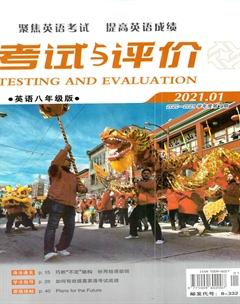情态动词各异 should用法独特
李天雨
同学们都知道情态动词是用来表示语气的单词,但是不能独立作谓语,只能和动词原形一起构成谓语。我们初中阶段常用的情态动词有:can, could, may, might, must, need, ought to, dare, shall, should, will, would等。今天我们只学习情态动词should。
一、should的用法
should作为情态动词与其余的情态动词一样,可用于各种人称,不随主语人称、数和时态的变化而变化,且后面永远跟动词原形。情态动词should主要有以下几种用法。
1. should用于第一人称时可以表示说话人的一种谦逊、客气、委婉的语气。
I should think it would be better to try it again. 我倒是认为最好再试一试。
You are mistaken, I should say. 依我看,你是搞错了。
2. 表示劝告或者建议,此时相当于had better,意为“应该”。
You should lie down and have a rest. 你应该躺下休息一会儿。
=Youd better lie down and have a rest.
We should study hard. 我们应该努力学习。
注意:should, ought to可通用,但在疑问句中常用should。
You should / ought to go to class right away. 你应该马上去上课。
3. 表示义务、责任。
As a student, you should work hard. 作为一名学生,你应当努力学习。
You should take good care of your parents. 你应该照顾好你的父母。
拓展:“ should+have+过去分词”结构一般表示义务,表示应该做到而实际上没有做到,并包含一种埋怨、责备的口气。
She should have finished it. 她本应该完成的。
I should have helped her, but I never could. 我本应该帮助她,但我永远也帮不了她。
4. 表示命令和要求,此时语气比较强烈。
You should complete your work on time. 你应该按时完成工作。
拓展:shouldnt带有命令的色彩,意为“不许”。
You shouldnt be so careless. 你不应该这么粗心。
You shouldnt talk in class. 你不许在课堂上讲话。
注意:ought to比should语气重一些,感情也比较强烈。
I should help her because she is in trouble. 我应该帮她,因为她有麻烦了。
You ought to take care of the baby. 你应该好好照顾孩子。
5. 表示预测或可能性。
The man in the white coat should be a doctor. 那个穿白大褂的人应该是医生。
He should be a teacher. 他应该是一名老师。
拓展:(1) ought to表示客观推测,must表示主观推测。
He must be home by now. 他现在一定已经到家了。(断定他已到家)
He ought to / should be home by now. 他现在应该到家了。(不太肯定)
(2) should還可以用在if引导的条件从句中,表示一件事听起来可能性很小,但也不是完全没有可能,相当于“万一”的意思。
Ask her to ring me up if you should see her. 你万一见到她,请让她给我打个电话。
If you should change your mind, please let us know. 万一你改变主意,请通知我们。
6. 表示说话人的情感,如惊奇、愤怒或失望等,常用于特殊疑问句中。
What should I do? 我该怎么办?
Why should I go? 为什么是我去?
拓展:Why / How+should结构表示说话人对某事不能理解,感到意外、惊异等意思,意为“竟会”。
Why should you be so late today? 你今天怎么来得这么晚?
—Where is Betty living? 贝蒂住在哪里?
—How should I know? 我怎么会知道呢?
二、should的基本句式
1. 肯定句:主语+should+动词原形+其他成分
I should say sorry. 我应该说对不起。
They should eat a lot of vegetables. 他们应该吃大量的蔬菜。
“should+动词原形”是句子的整个谓语动词部分。
2. 否定句:主语+should+not+动词原形+其他成分
You shouldnt smoke in the hospital. 你不应该在医院里面抽烟。
You shouldnt eat anything now. 现在你不应该吃任何东西。
should的否定是在其后加上not,缩写成shouldnt,再在其后加上动词原形和其他成分。
3. 一般疑问句:should +主语+动词原形+其他成分
肯定答语:Yes, 主语+should
否定答语:No, 主语+shouldnt
Should I go there right now? 我应该马上去那里吗?
—Its raining hard. Should we drive slowly? 雨下得很大。我们应该开慢点儿吗?
—Yes, we should. 是的,我们应该这样做。
should的一般疑问句是将should提前,且首字母大写。后面的句子按照一般陈述句的语序接在should的后面,并且把句号改为问号。
4. 特殊疑问句:特殊疑问词+should引导的一般疑问句
What should I do? 我应该做什么?
How long should I do it? 我应该做多久?
5. 反意疑问句:陈述句+简单的疑问句
We should try to save water, shouldnt we? 我们应该节约用水,不是吗?
He had been to Japan for several times, and he should be in Tokyo now, shouldnt he? 他去过日本很多次了,他现在应该在东京,不是吗?
含有情态动词ought to的反意疑问句,陈述部分是肯定的,疑问部分用shouldnt / oughtnt+主语。
We ought to help each other, oughtnt / shouldnt we? 我们应该互相帮助,不是吗?
并列复合句疑问部分,谓语动词根据邻近从句的谓语而定。
拓展:一些经常用来提建议或征求对方意见的句型:
Lets go and listen to the music, shall we? 讓我们去听音乐,好吗?
Let us wait for you in the reading-room, will you? 我们在阅览室等你,好吗?
注意:Lets开头的祈使句,后用shall we;Let us开头的祈使句,后用will you。

